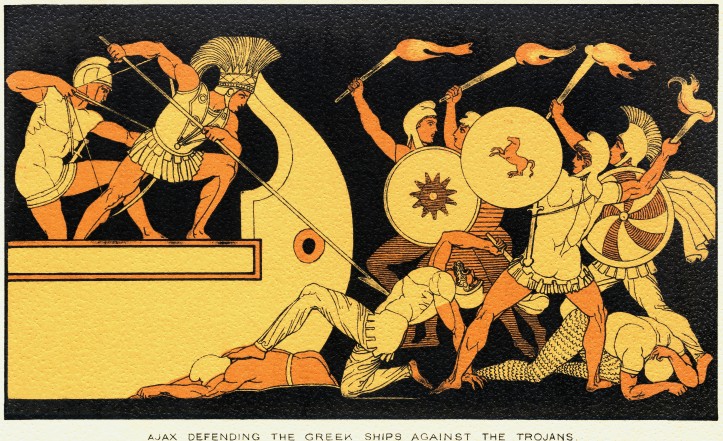The Greeks didn’t call it PTSD. But they understood that war brought trauma (from the Greek word meaning “wound”), which left some warriors with a “thousand-yard stare,” a phrase used by Sophocles, long after they returned home. Advocates and the military itself have found that ancient myths and stories like “Ajax” can help veterans and active-duty soldiers cope with the overwhelming psychological stress that the country’s longest war has put on its relatively small volunteer force.
The VA estimates that about 1,000 veterans of the Iraq and Afghanistan wars are diagnosed each week with PTSD, and another 800 with depression. Many more of the 2.5 million men and women who have been deployed in the war thus far likely suffer from these psychological conditions but remain undiagnosed, a burden that will persist far beyond the planned troop drawdown from Afghanistan at the end of this year.
Not having a baby-sitter meant that for a good 4 years I would spend my afternoons and evenings at the Central Library. Until my parents picked me up, I read voraciously, devouring the entire section on Greek Myth. It opened up an inner dialogue that has become vital in my life for helping me over come obstacles.
I came across a yahoo article which talked about Michael Meade myth-filled retreats for veterans called “Voices of Veterans.” He said some impactful things that gave me cause for reflection. In his retreats “he uses ancient stories from Ireland, Greece, India and other cultures to prod veterans into unloading their experiences and making sense of them over four-day retreats on the West Coast. Veterans in Meade’s program also sing ancient warrior chants together, take part in a “forgiveness” ceremony, and write and recite poetry. He believes that many ancient cultures did a better job of formally welcoming returning warriors home and helping to collectively shoulder some of their burdens.”
I believe it was Joseph Campbell who said that: Dreams are a private Myth and Myths are the public dream. What I like about that sentence is that its alludes to the fact that myth like dreams are a symbolic language that can connect us to our deeper selves personally and societally.
What struck me was Meade’s saying that: “Everyone wants to tell their story,” Meade said. “Even the most wounded people, given the chance, want to tell the story of that wound. A wound is like a mouth.” Our culture has an odd relationship with suffering, one that I want to explore more in depth later. Suffice it to say how many of us reading this have secret hurts and pains that we would love to get out but do not? The other sentence that struck me was this one: Some scholars believe all of Western literature developed from the need to tell the stories of returning soldiers.
If you are interested here is the article, be sure to check out some of the Vet’s Stories.
Supplemental Info
Campbell outlined four functions of myth. Myths laid the foundation for many social interactions that strengthens one’s inner connection, as well as their connection to their family elders, friends …Community at large really. There is a correlation between the relegation of myth to realm of the make believe and the fictitious I feel and many of the lost youth or society seems to mass produce.
- Metaphysical – Myth awakens and supports a sense of awe before the mystery of being. It reconciles consciousness to the preconditions of its own existence. Myth induces a realization that behind the surface phenomenology of the world, there is a transcendent mystery source.
- Cosmological – deals with the image of the world that is the focus of science. This function shows the shape of the universe, but in such a way that the mystery still comes through.
- Sociological – Myth supports and validates the specific moral order of the society out of which it arose. Particular life-customs of this social dimension, such as ethical laws and social roles, evolve dramatically.
- Psychological – The myths show how to live a human lifetime under any circumstances. It is this pedagogical function of mythology that carries the individual through the various stages and crises of life, from childhood dependency, to the responsibilities of maturity, to the reflection of old age, and finally, to death.




… a thousand yard stare … Sophacles describes it well. You know, I have not thought of a wound being like a mouth, wanting to tell it’s story. But its a good analogy.
I like Campbell’s ideas around myth and dream, I appreciate your reflection on them.
I particularly like this and am just thinking about a way to use this in my teaching: “Myth induces a realization that behind the surface phenomenology of the world, there is a transcendent mystery source.”
Thank you again for yet another thought-provoking piece of writing
LikeLike
Isabeau,
Sometimes you and a few others are the only reason I think I come back here to blog. Thanks for such a lovely comment
Dave
LikeLike